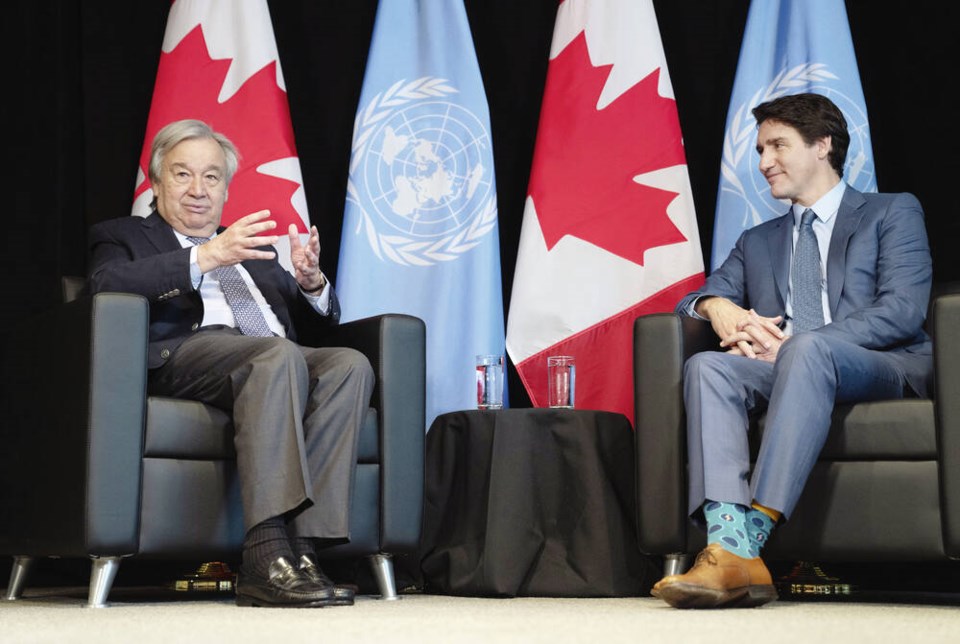Regular readers of my column will know that I have frequently quoted Antonio Guterres, the UN secretary general.
A former prime minister of Portugal, he was elected to the post in 2016 and re-elected in 2021.
He is the most important political leader on the planet today, heading up the most important organization on the planet.
What makes him so important, first and foremost, is that he is the only political leader whose focus is global, with a commitment to the whole world, the whole of humanity, the whole Earth.
Every other president, prime minister, king or sheikh has at the forefront their own country’s interests — or perhaps their own or their party’s or their faith’s interests or their family’s and cronies’ interests.
At its worst, such narrow self-interest can lead to war, as we see in Ukraine and many other parts of the world.
It also leads to economic and other policies that might seem to be beneficial to a country, or a segment of its population, but harm others because they are in another country, or harm the environment elsewhere on the planet.
Only too often, those policies are also shortsighted, geared to short-term gain even if it results in long-term pain, because (where they have elections) the next election matters, the next generation — not so much.
The second thing that makes Guterres so important, rooted in his global perspective, is that he has been making some remarkably blunt comments on the state of the world and what we need to do to avoid — or at least lessen — the impact of the multiple ecological and social crises we have created.
What makes the UN the most important organization on the planet is that at a time of accelerating global ecological, social and other crises, the UN is key to bringing people and nations together to find common interest, common purpose and a common agenda. It is, as Guterres has said, “the only institution with universal convening power.”
Yet only too often, the UN gets criticized for its apparent weakness and failings. I think we forget how hard it is to find a common agenda among almost 200 widely differing nations — it makes herding cats look like a walk in the park, to mix my metaphors.
In fact, it’s remarkable how often agreements are reached. But after 75 years without major reform, the UN needs updating, to become what Guterres has called UN 2.0, a UN “fit for a new era.”
So I thought it might be useful to summarize some of what he has been saying about the state of the world and the need for a reformed UN and strengthened multilateral approaches.
The best place to begin is with his very important September 2021 report Our Common Agenda, requested by the General Assembly to mark the UN’s 75th anniversary, and to look for ways to address the challenges of global governance.
In introducing his report, Guterres was clear: “On almost every front, our world is under enormous stress.”
He identified those stresses as “the climate crisis … our suicidal war on nature and the collapse of biodiversity … Unchecked inequality [which] is undermining social cohesion … Technology moving ahead without guard rails … [and] Global decision-making fixed on immediate gain, ignoring the long-term consequences of decisions.”
But, he noted, “the international community is manifestly failing to protect our most precious global commons: the oceans, the atmosphere, outer space, and the pristine wilderness of Antarctica. Nor is it delivering policies to support peace, global health, the viability of our planet and other pressing needs.”
As a result, he said, “we risk a future of serious instability and climate chaos.”
To address these shortcomings, he proposed a four-point action plan to strengthen multilateral approaches: strengthen global governance, focus on the future, on young people and future generations, renew the social contract and ensure a United Nations fit for a new era.
Making the UN work better is vital if we are to successfully manage the challenges facing us in the 21st century, so I will delve into these ideas in more detail in future columns.
Dr. Trevor Hancock is a retired professor and senior scholar at the University of Victoria’s School of Public Health and Social Policy.
>>> To comment on this article, write a letter to the editor: [email protected]



